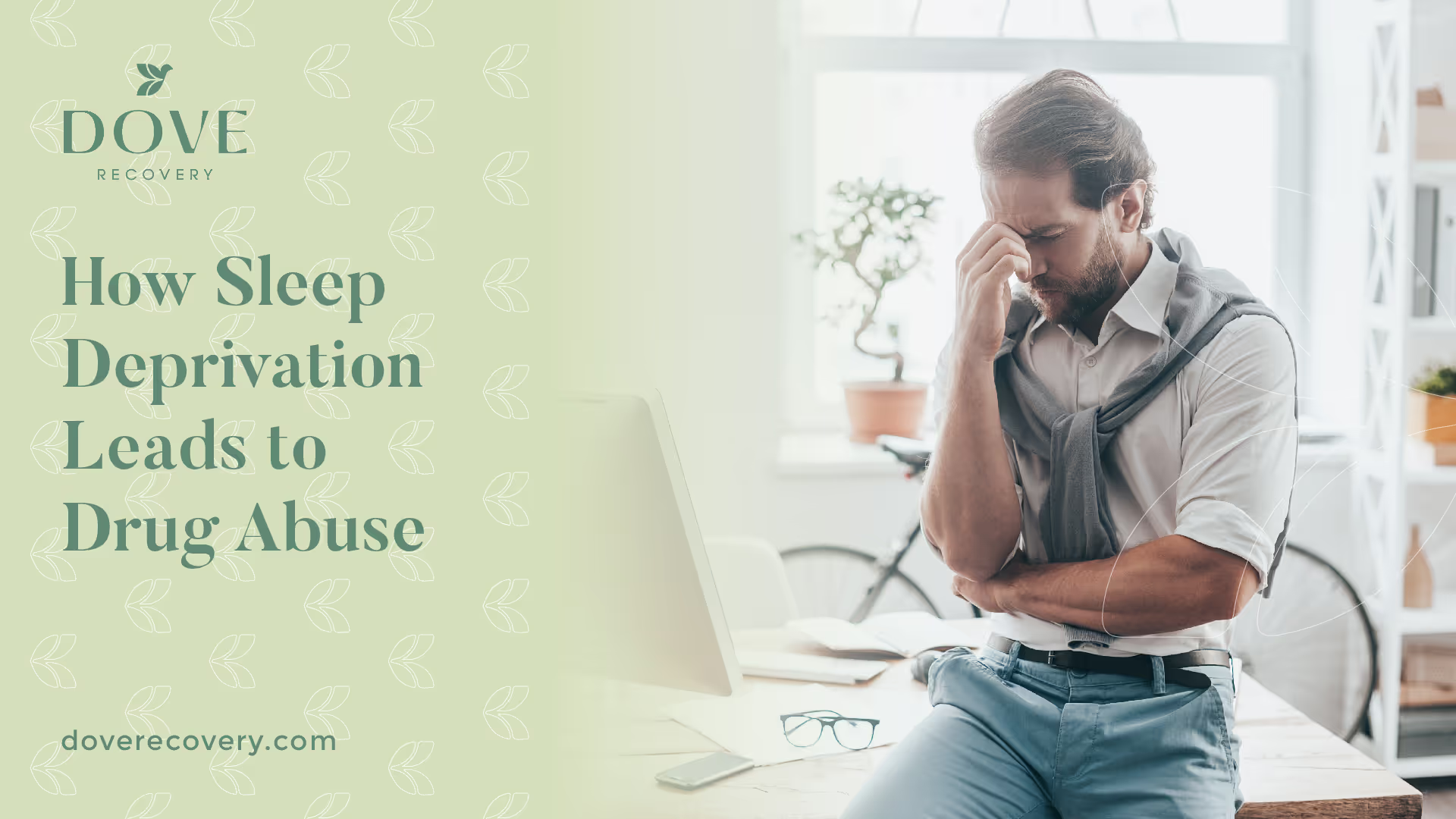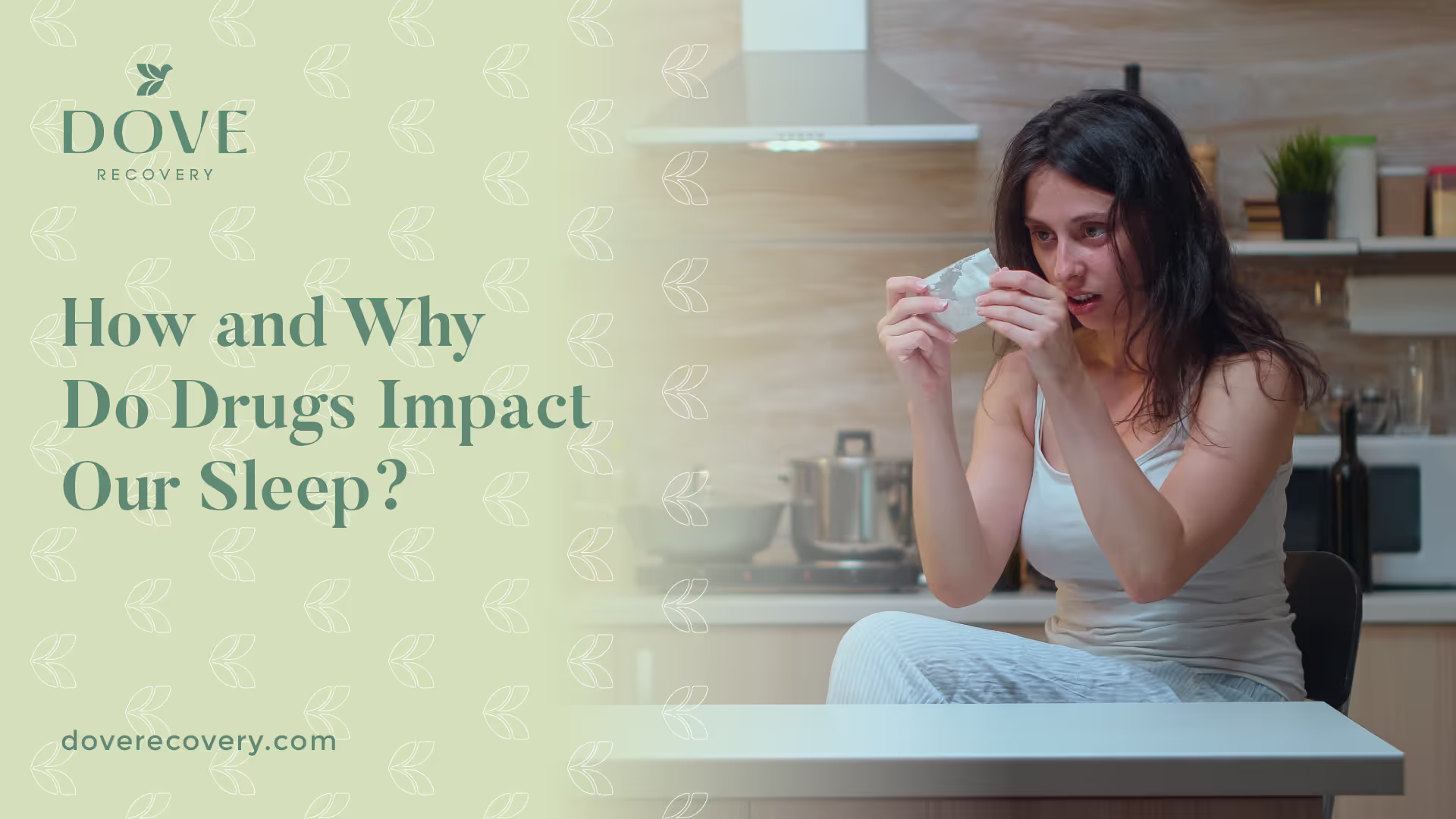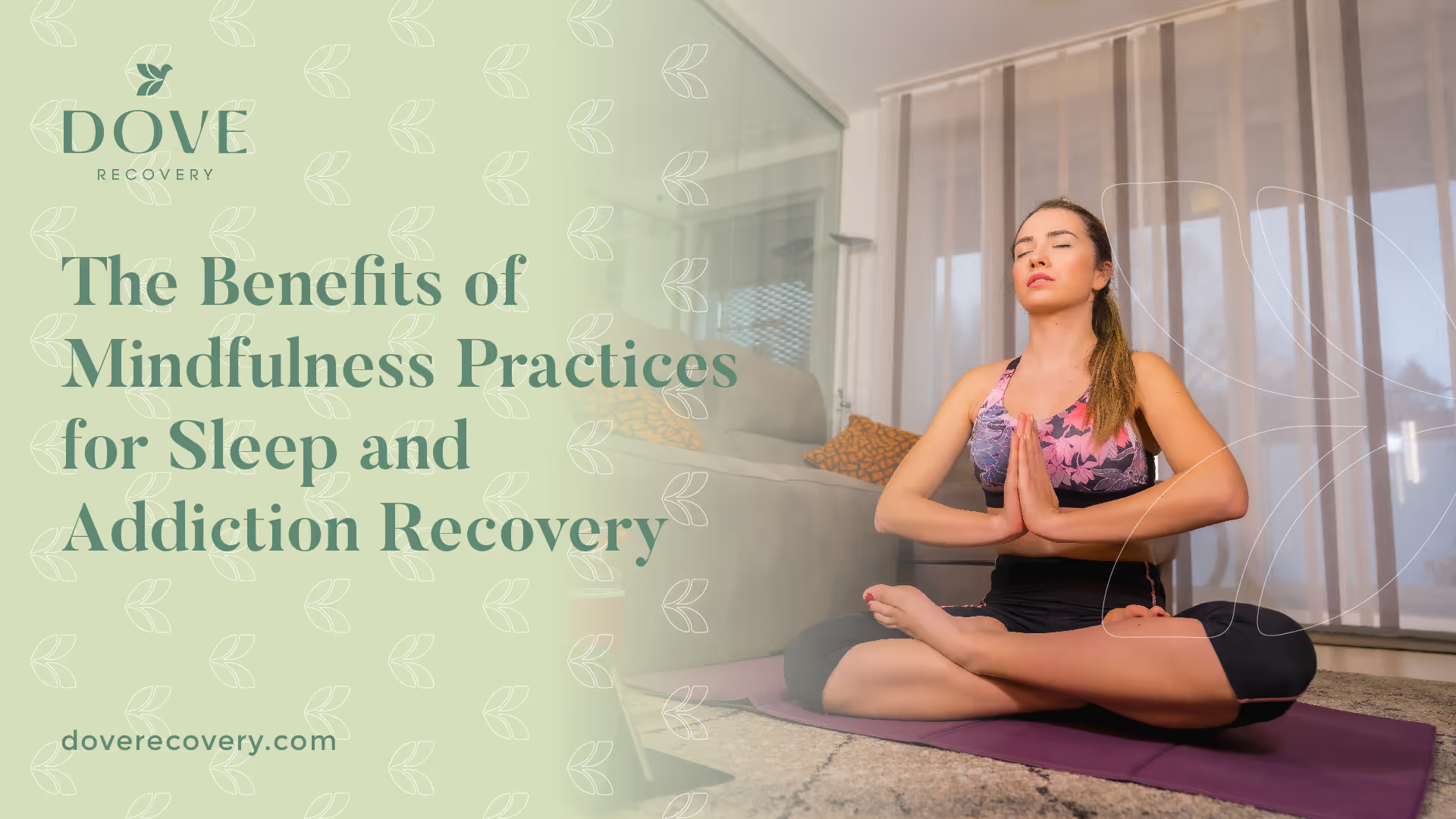Sleep And Addiction: How They're Connected

Are Sleep and Addiction Connected?
Sleep and addiction are two interconnected issues that can have a significant impact on a person's overall health and well-being. While it may not be immediately apparent, the quality and quantity of sleep a person gets can play a role in their risk for developing an addiction, and even their ability to recover from one.
Sleep deprivation can have a significant impact on a person's likelihood of developing an addiction. Research has shown that sleep plays a crucial role in regulating our mood, emotions, and stress levels. When we don't get enough sleep, our brain's reward center becomes more active, which can lead to an increase in cravings for addictive substances such as drugs or alcohol.
How Sleep Deprivation Leads to Drug Abuse

Sleep deprivation can have a significant impact on a person's susceptibility to drug addiction. Here are some ways in which sleep deprivation can lead to drug abuse and addiction:
Increased activity in the brain's reward center
Sleep deprivation can increase the activity of the brain's reward center, which is responsible for reinforcing behaviors that are pleasurable or rewarding. This increased activity can make individuals more susceptible to drug addiction by increasing their cravings for drugs and reducing their ability to resist those cravings.
Impairments in cognitive function
Sleep deprivation can also cause impairments in cognitive function and decision-making abilities, making it more difficult for individuals to resist the temptation of drugs. For example, sleep-deprived individuals may be more impulsive and less able to weigh the potential risks and benefits of drug use, leading them to make decisions that are not in their best interest.
How Sleep Deprivation Can Affect Drug Abuse:
- A study published in the journal Sleep found that adolescents who reported poor sleep quality were more likely to engage in substance use.
- Another study published in the journal Addiction Biology found that sleep-deprived mice were more likely to self-administer cocaine compared to mice that had adequate sleep.
- In addition to cocaine, sleep deprivation can also increase the risk of opioid abuse. A study published in the journal Pain found that chronic sleep deprivation increased the rewarding effects of opioids in rats.
Sleep deprivation can have a significant impact on a person's susceptibility to drug addiction by increasing activity in the brain's reward center and impairing cognitive function and decision-making abilities. It is important to prioritize getting enough quality sleep as part of a healthy lifestyle.
In addition, sleep deprivation can also exacerbate the withdrawal symptoms associated with drug addiction. A study published in the journal Sleep Medicine Reviews found that sleep disturbances are common during early abstinence from drugs such as cocaine and methamphetamine. These sleep disturbances can further increase the risk of relapse by making it difficult for individuals to cope with cravings and other withdrawal symptoms.
Overall, there is a clear link between sleep deprivation and addiction. Individuals who struggle with chronic insomnia or other sleep disorders should seek treatment in order to reduce their risk of developing substance use disorders.
The Role of Poor Sleep in Exacerbating Addiction Symptoms and Relapse
Poor sleep can also exacerbate addiction symptoms and increase the risk of relapse. When individuals are in recovery, they often experience symptoms such as anxiety, depression, and irritability. These symptoms can be triggered or worsened by poor sleep quality or quantity.
Research has shown that poor sleep quality is associated with a higher risk of relapse in individuals recovering from addiction. One study published in the Journal of Substance Abuse Treatment found that individuals who reported poor sleep quality were more likely to relapse within the first 6 months of recovery.
Additionally, poor sleep can make it harder for individuals to regulate their emotions and cope with stressors, which are common triggers for addictive behaviors. Inadequate sleep can lead to increased feelings of anxiety, depression, and irritability, making it more challenging for individuals to resist cravings for addictive substances.
Furthermore, when individuals are sleep-deprived, they may have less energy and motivation to engage in healthy habits such as exercise or socializing with supportive friends and family members. This can contribute to feelings of isolation and loneliness, which are also risk factors for addiction.
Therefore, it's essential for individuals in recovery to prioritize getting enough high-quality sleep as part of their overall treatment plan. This may include practicing good sleep hygiene habits such as establishing a regular bedtime routine and avoiding screens before bed. Additionally, healthcare professionals working with individuals in recovery should assess their patients' sleep quality and provide appropriate interventions if necessary to reduce the risk of relapse.
How and Why Do Drugs Impact Our Sleep?

Drug use can have a significant impact on our sleep patterns, which can further exacerbate the risk of addiction. Drugs can interfere with the body's natural ability to fall asleep and stay asleep, leading to chronic sleep deprivation. Here are some ways in which drugs can impact our sleep:
Stimulants
Drugs such as cocaine and methamphetamine are stimulants that can keep users awake for extended periods. They work by increasing levels of dopamine in the brain, which makes users feel more alert and awake. However, these drugs can also interfere with the body's natural sleep-wake cycle, making it difficult for users to fall asleep even when they want to.
Opioids
Opioids such as heroin and prescription painkillers can cause drowsiness and sedation. While this may seem like it would help users fall asleep more easily, opioids can actually disrupt REM (rapid eye movement) sleep, which is crucial for restoring the body's energy levels and repairing tissues. As a result, opioid users may experience poor quality sleep that leaves them feeling groggy or fatigued even after a full night's rest.
Alcohol
While alcohol is technically a depressant that can make users feel sleepy or relaxed initially, it also interferes with REM sleep later in the night. This means that even if someone falls asleep quickly after drinking alcohol, they may still wake up feeling unrested or groggy due to poor quality sleep.
Overall, drug use can have a negative impact on our ability to get enough high-quality sleep each night. Chronic sleep deprivation caused by drug use can further increase the risk of addiction by disrupting our brain's reward system and increasing cravings for addictive substances. Therefore, it's essential for individuals struggling with addiction to address both their substance abuse issues and their sleep problems as part of their overall treatment plan.
The Impact of Addiction on Sleep Quality and Quantity
Substance abuse can have a significant impact on the quality and quantity of sleep a person gets. Individuals who abuse drugs or alcohol may experience disrupted sleep patterns, insomnia, or excessive daytime sleepiness.
Disrupted Sleep Patterns
Drugs such as cocaine, methamphetamine, and amphetamines can interfere with the body's natural ability to regulate sleep-wake cycles. These drugs can cause users to stay awake for extended periods, leading to chronic sleep deprivation and disrupted sleep patterns. As a result, individuals who abuse these substances may experience difficulty falling asleep or staying asleep throughout the night.
Insomnia
Insomnia is a common side effect of drug use, particularly among individuals who abuse stimulants such as cocaine or methamphetamine. These drugs can increase alertness and make it difficult for users to fall asleep even when they feel tired.
Additionally, withdrawal symptoms associated with substance abuse can also cause insomnia. For example, individuals withdrawing from opioids may experience restlessness, anxiety, and insomnia as their body adjusts to the absence of the drug.
Excessive Daytime Sleepiness
Some drugs such as opioids and benzodiazepines can cause excessive daytime sleepiness. This side effect can be particularly dangerous for individuals who need to operate heavy machinery or drive a vehicle.
Furthermore, poor-quality sleep caused by substance abuse can lead to excessive daytime sleepiness even in individuals who do not typically experience this symptom. Chronic sleep deprivation caused by drug use can leave users feeling groggy or fatigued during the day.
The Benefits of Mindfulness Practices for Sleep and Addiction Recovery

Mindfulness practices, such as meditation and yoga, have been shown to improve both sleep quality and addiction recovery outcomes. These practices can help individuals regulate their emotions and reduce stress levels, which can be beneficial in both preventing addiction and supporting recovery.
Improving Sleep Quality
Research has shown that mindfulness practices can improve sleep quality by reducing symptoms of insomnia and improving overall sleep duration. By practicing mindfulness techniques before bed, individuals may find it easier to fall asleep and stay asleep throughout the night.
Additionally, mindfulness practices can help individuals manage stress levels that may contribute to poor sleep quality. By reducing feelings of anxiety or depression through mindfulness techniques, individuals may experience a greater sense of calmness that translates into better sleep quality.
Supporting Addiction Recovery
Mindfulness practices have also been shown to support addiction recovery outcomes. By helping individuals regulate their emotions and manage cravings, these practices can be an effective tool in preventing relapse.
One study published in the Journal of Substance Abuse Treatment found that mindfulness-based relapse prevention was more effective than traditional relapse prevention programs in reducing the risk of relapse among individuals recovering from substance use disorders.
Furthermore, mindfulness practices can help individuals cope with withdrawal symptoms associated with addiction recovery. By increasing self-awareness and acceptance of difficult emotions, these techniques can reduce feelings of anxiety or depression that often accompany early sobriety.
Incorporating mindfulness practices into a daily routine can be an effective way to improve both sleep quality and addiction recovery outcomes. By reducing stress levels, managing emotions, and supporting overall well-being, these techniques offer a holistic approach to health that addresses both the physical and psychological aspects of recovery.
On the other hand, getting enough restful sleep can have a positive impact on a person's addiction recovery. Sleep is essential for the brain to repair itself and form new neural pathways, which can help a person break free from addictive behaviors and thought patterns.
Furthermore, sleep can help reduce stress levels, which is often a trigger for addictive behaviors. By getting enough sleep, a person can better manage their stress and reduce the likelihood of turning to drugs or alcohol as a coping mechanism.
It's worth noting that the relationship between sleep and addiction is not one-sided. Addiction can also have a significant impact on a person's ability to get restful sleep. Drugs and alcohol can disrupt the body's natural sleep cycle, leading to insomnia, nightmares, and other sleep disturbances.
In some cases, a person may even develop a dependence on drugs or alcohol to help them fall asleep, making it even more challenging to break free from addictive behaviors and get the rest they need.
What Can a Person Do to Improve Their Sleep Habits and Reduce Their Risk of Addiction?
Here are a few tips:
Establish a consistent sleep schedule
Maintaining a consistent sleep schedule is important for ensuring quality sleep and promoting overall health. Going to bed and waking up at the same time every day can regulate your body's internal clock, improve sleep quality, and enhance productivity. Tips for maintaining a regular sleep schedule include avoiding daytime naps, creating a relaxing bedtime routine, and keeping your bedroom comfortable and dark.
Create a relaxing bedtime routine
Creating a relaxing bedtime routine can help promote relaxation, reduce stress, and prepare your body and mind for sleep. Activities such as taking a warm bath, reading a book, or listening to calming music can help you wind down before bed. Additional tips include avoiding electronics, practicing relaxation techniques, and keeping your bedroom cool and dark to promote restful sleep. By establishing healthy sleep habits, you can support overall well-being.
Avoid screens before bedtime
Electronic devices such as smartphones, tablets, and laptops emit blue light, which can disrupt your body's natural sleep-wake cycle. Blue light suppresses melatonin production, delays the circadian rhythm, and disrupts sleep patterns. To minimize the impact of blue light on your sleep, try to avoid electronic devices before bed, use dimmer lighting in the evening, and establish a regular sleep routine. By establishing healthy sleep habits, you can support overall well-being.
Get regular exercise
Regular physical activity is important for overall health and can also benefit sleep quality and stress reduction. Exercise reduces stress, promotes relaxation, and regulates circadian rhythm. Tips for incorporating physical activity into your routine include starting slowly, finding activities you enjoy, and scheduling exercise earlier in the day. By establishing healthy habits, you can support overall well-being.
Seek professional help
If you're struggling with addiction or sleep disturbances, seeking help from a healthcare professional is important. They can provide guidance, medical management, and access to resources such as support groups or counseling services. Signs that it may be time to seek professional help include difficulty managing symptoms on your own, interference with daily life, and concerns about self-treatment. Working with a healthcare professional can help you develop a tailored treatment plan and gain access to additional resources for better health.
Conclusion
The relationship between sleep and addiction is complex and multifaceted. Poor sleep quality can increase the risk of addiction, while drug use can disrupt the body's natural sleep-wake cycle. However, by prioritizing good sleep hygiene habits and seeking professional help for addiction and sleep disturbances, individuals can take steps to improve their overall health and well-being.
It's essential for healthcare professionals working with individuals in recovery to assess their patients' sleep quality and provide appropriate interventions if necessary to reduce the risk of relapse. Incorporating mindfulness practices into a daily routine can be an effective way to improve both sleep quality and addiction recovery outcomes.
By addressing both substance abuse issues and sleep problems as part of an overall treatment plan, individuals can break free from addictive behaviors and establish healthy habits that support long-term wellness. Investing in good-quality restorative sleep is a crucial step towards achieving optimal physical, mental, emotional health, which is essential for leading a fulfilling life.
Sources:
National Institute on Drug Abuse. (2018). "Drugs, Brains, and Behavior: The Science of Addiction." Retrieved from https://www.drugabuse.gov/publications/drugs-brains-behavior-science-addiction/drugs-brain.
National Sleep Foundation. (n.d.). "How Alcohol Affects the Quality -- and Quantity -- of Sleep." Retrieved from https://www.sleepfoundation.org/articles/how-alcohol-affects-quality-and-quantity-sleep.
National Sleep Foundation. (n.d.). "Sleep and Addiction." Retrieved from https://www.sleepfoundation.org/articles/sleep-and-addiction.
